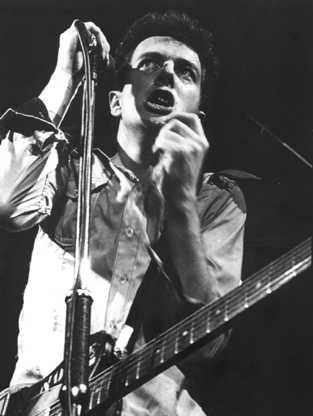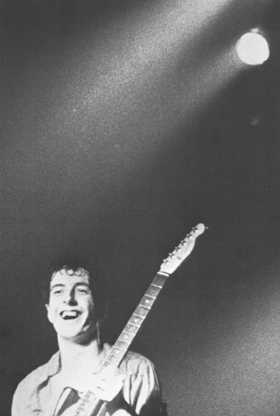 Music
MusicI got turned onto the Clash in college. "London Calling" was about the best rock album I'd ever heard, and may still be. Without being preachy, it said it all - how we're lost in the supermarket, how the war had been declared already - and it even ended with a great Mick Jones love song. Over the years, I turned on a bunch of kids to the Clash when I was a teacher and camp counselor, and most of them turned out alright. I don't know if Joe Strummer had anything to do with it, but I think he did. I think when you hear honesty, you don't forget it.
I saw Joe Strummer live three times in the last four years. The first time was a thrill - I thought he'd be much older than he seemed, and I never thought I'd get to see him in concert anyway. The second time was just great - a great mosh pit at the Roseland, Joe singing his heart out, "White Riot" driving the real fans crazy. The third time, I almost didn't go; it was last fall, not too long after September 11, and I'd seen him twice already. But I went on the spur of the moment, and when he covered Blitzkrieg Bop ("dis one's fer Joey!" he said in New York talk), it was all worth it. Just the joy of it. Joe Strummer's new material never really reached me, but I appreciated that he wasn't trying to be what we all wanted. He was giving us honesty - giving us what he wanted to play. At the shows, the politics didn't seem too relevant - the songs were what mattered - but now I realize, that was what the politics was always about, for me: the honesty. Politics is based on lies; punk exposes them. And no musician, not even Dylan, was more honest than Joe Strummer.
Jay Michaelson
I was too young for Nirvana. By the time i turned on my radio Kurt was a
rock 'n' roll suicide and the band was the treasure of the very people you
get into punk rock to avoid. For me it was when a friend lent me a disc man
and a copy of "London Calling" for a 3 hour bus ride that I was finally
introduced to the electrokinetic-dionysiantranscendence-soulfoodgoodness of
roots rock rebel music. By the time I'd finally collected the Clash's entire
catalog, plus some bootlegs, "Rude Boy", a 101ers cd and "Earthquake
Weather", Joe finally was reemerging from a 10 year hiatus and I had the
privilege of being able to catch my guitar hero invigorate the songs he had
written 30 years ago with the same teen-fueled intensity -- if not agility --
of his legendary stage presence from the early Blank years. There was no
going through the motions -- when Joe Strummer sang it you could feel the
sincerity radiate throughout your nervous system with that shivery-tingley
challenge to respond that is demanded by the 3-chord wonder of rock and roll.
Joe Strummer has been described as the affirmative aye that fills the void
left from Johnny Rotten's nihilistic negation. The Zarathustra role is a hard
one to fill out without falling over into self-righteous dogmatic filth that
degenerates the vision of the prophet-destroyer. Joe gave it a good go.
Though he was a rock star, Joe's interest in music was not the
coke-models-pride formula of star excess. He was interested in music for the
way in which the medium may be appropriated, and transformed into it into a
a call for "a riot of your own," to overcome the world of resentiment and
realize a changed world through yourself.
Kathleen Hanna wrote in 1991 that "a belief in instant
revolution is just what THE POWERS THAT BE want. That way we won't realize
that WE ARE THE REVOLUTION." The Clash and Joe promoted not just a DIY
fashion statement but a DIY world, a reconstruction of the world in the wake
of the destructive path of punk's No, and they did it with a sincerity and
directness that left little choice but to listen.
As we sit paralyzed by the reemergence of the neoconservativism that punk
emerged in response to 25 years ago, Joe's voice once again finds its place
as catalyst for the eruption of emotion and outrage that lead to the first
steps for creating something better. Joe never wanted the role of the latest
RIP Joe
 fashionable celeb, but wanted to reach out to his audience and connect to with them
as equals, whether it be saving his fans from terrorizing 'security guards'
or stopping sing-posters on the street to get the word on a new band.
Likewise, his death should not be treated as the latest rock and roll tragedy
(they do seem to be coming all too frequently now) but the loss of a fellow
activist in the stuggle against average everydayness, who offered one vision
of a new world to be built on the ruins of the present one, a vision he
shared rather than imposed. Joe maintained that death or glory was just
another story; the renewed critique and construction anew of Joe's
post-destruction affirmation transcends that, and is his punk rock dream come
true.
fashionable celeb, but wanted to reach out to his audience and connect to with them
as equals, whether it be saving his fans from terrorizing 'security guards'
or stopping sing-posters on the street to get the word on a new band.
Likewise, his death should not be treated as the latest rock and roll tragedy
(they do seem to be coming all too frequently now) but the loss of a fellow
activist in the stuggle against average everydayness, who offered one vision
of a new world to be built on the ruins of the present one, a vision he
shared rather than imposed. Joe maintained that death or glory was just
another story; the renewed critique and construction anew of Joe's
post-destruction affirmation transcends that, and is his punk rock dream come
true.



film politics music jay's head poetry art josh ring fysche saddies about archive
